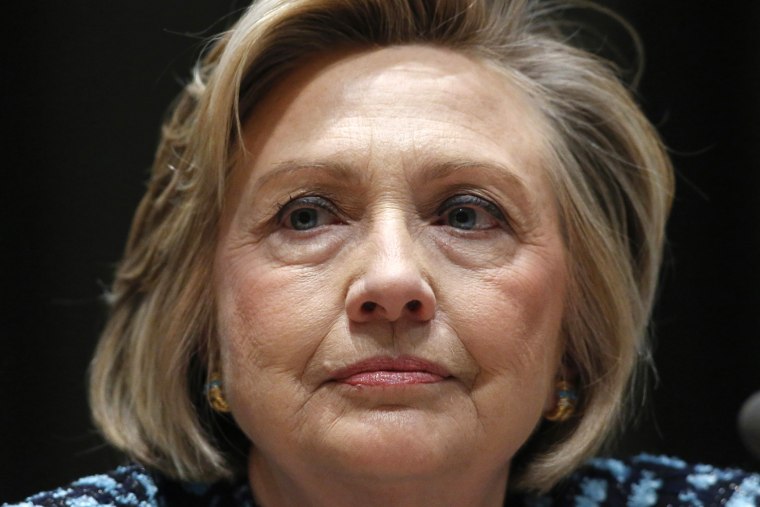Allies of Hillary Clinton are pushing back on criticism that she used a private email account to conduct business while secretary of state, even as attacks pile up.
Late Monday, The New York Times reported that Clinton never set up an official email account, instead relying on a personal email address during her entire tenure as America's top diplomat. Republicans were quick to accuse Clinton of skirting public records laws, contending it fits into a pattern of Clinton conducting business in a secretive and ethically questionable manner. Allies say she did nothing out of the ordinary.
RELATED: Report: Hillary Clinton used private email throughout tenure at State Dept.
An aide close to former Secretary of State Condoleezza Rice, who held the job in President George W. Bush's second term, told msnbc that Rice did not use personal email on the job, though she rarely used email at all. "Secretary Rice rarely used email during her tenure at State," the aide said. "On the very rare occasion she did, her State email was the vehicle for official communication. She did not use personal email for official communication as Secretary."
Former Secretary of State Madeleine Albright, who served as secretary of state under President Bill Clinton during his second term, also “did not use email while she was in office," an aide told msnbc, though email was less central to business when Albright was in office in the 1990s.
Colin Powell, George W. Bush's first secretary of state, wrote in his memoir about how outdated technology infrastructure at the State Department led him to install a personal laptop in his office to use a personal email account to “shoo[t] emails to my principal assistants, to individual ambassadors, and increasingly to my foreign-minister colleagues.”
Powell, who served from 2001-2005, apparently did not keep a record of personal emails, unlike Clinton. Though, like Clinton, his emails to official government accounts would have been automatically logged.
The State Department, in a statement, said that a rule requiring the preservation of personal emails did not go into effect until September 2013, after Clinton left the post. The rule was enacted in response to a presidential memorandum issued in November 2011, after Clinton was already in office.
For allies, this exonerates Clinton. “Two years after she left office the National Archives set new regulations and all former Secretaries of State were asked to make sure official business in emails was archived. Hillary made sure more than 55,000 pages of emails were archived. She did this months ago,” said Adrienne Elrod of the pro-Clinton rapid response group Correct the Record.
“This is yet another nasty overreach by Republicans who are grasping to find something incriminating that doesn’t exist," Elrod added.
Last October, to comply with the 2013 ruling, the State Department asked former secretaries of state to turn over any personal emails used and now advises officials against using personal address for official business. “We are updating our processes to meet our obligations, but there was a need for clarity and that's why [the Records Administration] put out its 2013 guidance,” a senior State Department official told NBC News.
Even so, the GOP was quick to accuse Clinton of hypocrisy, highlighting a quote from Clinton's first presidential run when she called herself “probably the most transparent person in public life.”
In 2003, Clinton criticized the Bush administration for a lack of transparency. “Nowhere is this more important than in the transparency of government decisions. Without such transparency, how can leaders be accountable? How can people be informed? And without such transparency, the openness and information that is required for the lifeblood of a democracy to be healthy and strong, the pillars of that democracy are shaken,” Clinton, then a New York senator, said during a speech at the Center For American Progress.
RELATED: A presidential-campaign sized hole in Clinton's calendar?
The Republican National Committee is tying the email controversy to questions about foreign government donations from the Clinton Foundation. “This revelation follows news that the Clinton Foundation accepted foreign donations while Hillary was Secretary of State. It makes you wonder: Did she use the private emails so she could conduct diplomacy and fundraising at the same time?” asked RNC Chairman Reince Priebus, though there is no evidence that is the case.
And Clinton is finding some less likely critics as well. Former Obama press secretary Robert Gibbs called her email practices “highly unusual” on NBC’s “Today” show Tuesday morning. “There are lots of briefings that you have, certainly when you go into the White House about preserving any email that you have, making sure it’s part of your official account,” Gibbs said.
Clinton spokesperson Nick Merrill told reporters Tuesday morning that there were "inaccuracies" in The New York Times report, and said Clinton used a personal email account "like Secretaries of State before her." A former aide told Bloomberg that Clinton used the account to send short directives and avoid the clunky official system, but that she never used it for classified messages. The U.S. government has several secure communications systems for classified text, video and voice communications, which Clinton presumably used for sensitive matters.
